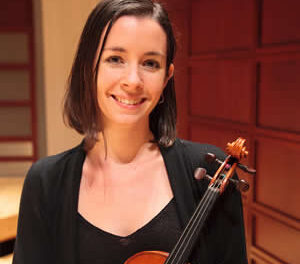There is more than one Carnegie Hall in which fine music is heard — certainly the one in New York City, but also in the library of Guilford College, summer home of the Eastern Music Festival. Tuesday night’s chamber music concert was the second of five this summer, and as is typical for this series, a wide variety of music was performed by just as diverse a combination of instruments.
Opening the evening was Eugene Bozza’s four-movement Sonatine for Brass Quintet (1951). According to the program notes, this is the composer’s most popular work, and it’s easy to hear why. The sprightly, energetic first movement features saucy melodic lines that weave in and out of the ensemble. The graceful trumpet lines of the opening of the second movement become more stern. The scherzo is a lively romp, and the finale begins with a military fanfare that leads to a wacky accelerando into a headlong rush to the end. Great fun and terrific playing characterized the performance of this 10-minute work. The entire ensemble played with pride and force: Judith Saxton and Robert White, trumpets; Kelly Schurr, horn; Gregory Cox, trombone; and Lee Hipp, tuba.
Brazilian-born Heitor Villa-Lobos is known for his use of native rhythms in most of his music. Nowhere is this more true than in the numerous pieces he wrote under the title of “Chôros.” His No. 2, for Flute and Clarinet, is a scant, quirky and impertinent work. Sometimes the flute and clarinet dart in different directions, sometimes the clarinet plays a dance-like rhythm over which the flute waxes melodious. Flutist Ann Choomack and clarinetist Judith Donaldson strongly played this 5-minute piece.
A quartet of musicians comprised of Uli Speth and Ioana Galu, violins, Diane Phoenix-Neal, viola, and Rebecca Zimmerman, cello, offered two very contrasting works — one by Anton Webern, the other by George Gershwin. Webern’s 1905 “Langsamer Satz” (Slow Movement) is an anomaly from the pen of a composer known for his stringent atonal offerings. This 9-minute work is a romantic foray, telling the story of two lovers hiking in nature. Melodies are pretty equally divided among the four instruments, with some especially nice ones given to the viola, beautifully played by Phoenix-Neal. All in all, the work is lush and romantic, and very short on dissonance.
Gershwin’s “Lullaby” is a movement from a string quartet the composer wrote in 1919 but was not premiered until 1967. Since then, it has become a popular chamber work. It is gentle and tuneful but less jazzy than one might expect. Speth led the ensemble with good nuance and Zimmerman made the most out of some particularly nice moments for the cello.
The second half of the evening was devoted to a single work, Mendelssohn’s 4-movement Piano Trio in D minor, Op. 49. This is a magnificent composition and was assertively and lovingly played by Randall Weiss, violin, Marta Simidtchieva, cello, and Yoshikazu Nagai, piano. The composer is completely democratic in his distribution of important material among the three instruments. The two prominent tunes in the first movement, for example, are first presented by the cello, which Simidtchieva gorgeously shaped. The triple meter of the first movement gives it a bit of a dance feel, which all three musicians strongly conveyed. For the record, there were occasional moments when balance between the three was out of kilter.
The slow second movement is initiated by the piano; the lyric nature reminds one of the composer’s famous Songs Without Words. Nagai played these solo passages with great rhythmic freedom which made the music a living presence. Violin and cello, often doubling each other, added variations.
You’ve got to love Mendelssohn for his ability to write magical fairy music, nowhere better than in the Scherzo movement of this Trio. Nagai played with amazingly fleet fingers, offering a halo of sound into which violin and cello plunged.
The finale closes the work with passion and dance-rhythms. It was in this movement that Weiss’ playing was especially impressive, with solid intonation and passionate playing. Kudos to all three musicians for an exciting and sturdy performance.











